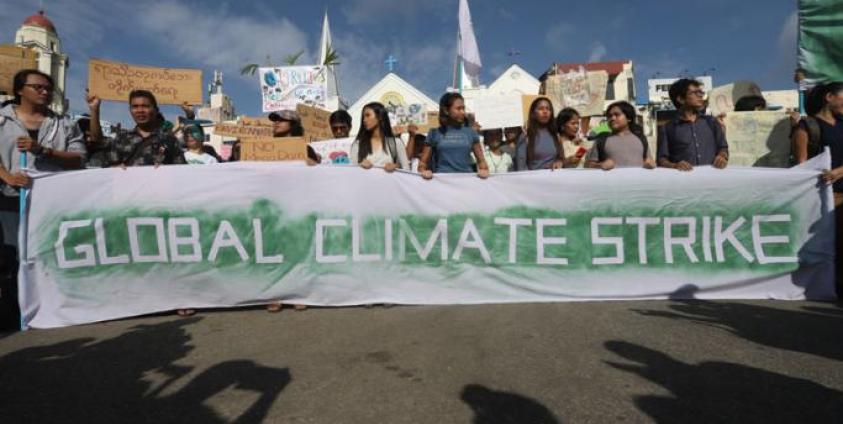People took to the street in Yangon on September 22 to participate in the Global Climate Strike Myanmar.
The activity was led by youth organizations and students numbering about 200 or more people. They marched from new Bogyoke Market to Sule Pagoda, and then gathered outside Mahabandoola Park.
Activists from Myanmar joined the movement since the global climate strike movement began on May 24.
Strike for Climate Myanmar has made three basic demands. Firstly, they have urged the government to officially recognize emergency situations related to climate and to take the required action. Secondly, they have called for a stop to all projects that can harm the natural environment and climate as soon as possible. And, thirdly, they called for environmental justice for all in Myanmar society.
Strike for Climate Myanmar says the situation of the natural environment is bad in developing countries like Myanmar, so they think they should urge relevant authorities to establish suitable policies for natural disaster management and to implement those policies, and that’s why they organized the activity.
Myanmar is particularly prone to the negative consequences of climate change and natural disasters, from the extremes of flooding to drought, at times exacerbated by man’s activities. Recently, thousands of people were displaced by flooding, particularly in Mon State. In one incident, a serious landslide led to the deaths of 69 people.
The risks of climate change to Myanmar were discussed at a seminar for MPs organised by the United Nations Development Programme (UNDP) in Naypyitaw last week.
As Camilla Fenning, Head of the South East Asia Climate and Energy Network, UK Foreign Office, said that hearing from MPs about Myanmar’s climate and environmental challenges underlined the need for urgent climate action by all countries to reduce greenhouse gas emissions and step up collaboration on resilience and climate finance. Discussions also highlighted Myanmar’s huge potential for renewable energy and the economic and environmental benefits investment in green growth could bring.
The seminar took place after fresh concerns have been raised about the impact of the climate change crisis on Myanmar. The historian U Thant Myint-U has called it the biggest challenge facing the country, recently saying that “the impact of climate change on Myanmar will be nothing less than catastrophic.”
Nicholas Davies, UK environmental specialist said that climate change could have profound implications for South East Asia and Myanmar in particular. Hluttaw committees will have an important role in scrutinizing progress on this issue.
Timothy Boyle, a UN expert on the dangers of deforestation in Myanmar, concluded that forests are an integral part of Myanmar’s economy, environment and culture, and are also the source of around 80 per cent of Myanmar’s greenhouse gas emissions. Therefore action to ensure conservation and sustainable management of Myanmar’s forests is essential.
Myanmar has been one of the three countries most affected by weather-related damage (storms, floods, heat waves etc.) in the last two decades, according to the Global Climate Risk Index 2019.
Scientists warn that climate change will lead to an increase in the frequency and intensity of heatwaves, droughts, floods and other extreme weather events.
The climate of the planet is changing because deforestation and the burning of fossil fuels - like coal, oil and gas – is causing a build-up of heat-trapping greenhouse gases in the atmosphere. South-East Asia is one of the regions of the world most at risk from climate change. Poverty levels remain high and a large proportion of the population and economic activity is concentrated along coastlines and rivers. The region is heavily reliant on agriculture and dependent on natural resources and forestry that are vulnerable to weather events and changes in the climate.
Myanmar has signed the Paris agreement and submitted its NDC in 2017. Decisions that policymakers in Myanmar take in the coming years will be crucial in determining whether the country protects its existing forests and biodiversity and invests in clean low-carbon electricity generation or more polluting alternatives like coal.
Myanmar climate strikers take to the streets of Yangon. Photo: Thura for Mizzima








